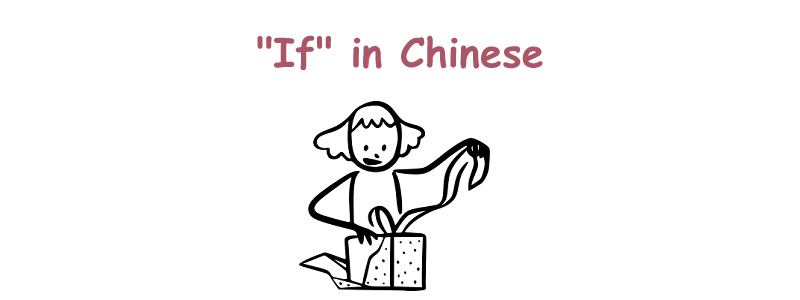Introduction:
Ever noticed how English mainly uses “if,” while Chinese has multiple ways to express the same idea? The terms 假如 jiǎrú, 万一 wànyī, 要是 yàoshi, 如果 rúguǒ, 的话 dehuà, 假设 jiǎshè, 倘若 tǎngruò, and 若是 ruòshì are all used to express conditional statements in Chinese, but they have subtle differences in usage and connotation.
如果 rúguǒ (HSK 2)
- Most common and neutral
- Used in both formal/informal situations
如果明天下雨,我就不去了如果明天下雨,我就不去了
If it rains tomorrow, I won’t go
如果你的母語是英文,就可以在台灣當英文老師如果你的母语是英文,就可以在台湾当英文老师
If English is your native language, you can be an English teacher in Taiwan.
要是 yàoshi (HSK 2)
- More colloquial than 如果 rúguǒ
- Often used in spoken Chinese
- Slightly emphasizes the condition
要是你不喜歡,可以換別的要是你不喜欢,可以换别的
If you don’t like it, we can change to something else
要是你不去,我就不去要是你不去,我就不去
If you don’t go, I won’t go.
…的话 dehuà (HSK 3)
- Casual, conversational
- Often used at the end of a condition
- Can combine with other conditionals
你要去的話,請提前告訴我你要去的话,请提前告诉我
If you’re going, please let me know in advance
人生可以重來的話,我就會買樂透然後買房子人生可以重来的话,我就会买乐透然后买房子
If life could be restarted, I would buy a lottery ticket and then buy a house.
假如 jiǎrú (HSK 4)
- More formal than 如果 rúguǒ
- Implies hypothetical situations
- Often used in written Chinese
假如我是富翁,我就會環遊世界假如我是富翁,我就会环游世界
If I were rich, I would travel around the world
假如我是你,我就會直接告訴他假如我是你,我就会直接告诉他
If I were you, I’d just tell him directly.
万一 wànyī (HSK 4)
- Means “in case” or “just in case”
- Implies unexpected or unwanted situations
- Often used for precautionary scenarios
萬一發生意外,請立刻打電話給我万一发生意外,请立刻打电话给我
In case of emergency, call me immediately
萬一我死了,請你幫我照顧我的狗万一我死了,请你帮我照顾我的狗
If I die, please help me take care of my dog.
若是 ruòshì (HSK 5)
- Literary/classical style
- Similar to 倘若 tǎngruò
- Formal written Chinese
若是天氣晴朗,我們即可登山若是天气晴朗,我们即可登山
Should the weather be clear, we can climb the mountain
若是你還有什麼遺言,就快說吧!若是你还有什么遗言,就快说吧!
If you have any last words, say them now!
假设 jiǎshè (HSK 6)
- Most formal/academic
- Used for theoretical suppositions
- Common in academic writing
假設地球是平的,那麼…假设地球是平的,那么…
Supposing the Earth were flat, then…
假設太陽往西斜10度,那麼對地球會有什麼影響假设太阳往西斜10度,那么对地球会有什么影响
If the sun tilted 10 degrees westward, what would be the impact on Earth?
倘若 tǎngruò (HSK 7-9)
- Literary/classical style
- Rarely used in modern spoken Chinese
- Very formal
倘若情況允許,我們可以考慮倘若情况允许,我们可以考虑
Should circumstances permit, we can consider it
倘若我明日能活著回來,我們就成親倘若我明日能活着回来,我们就成亲
If I can come back alive tomorrow, we’ll get married.
Usage tips
- Everyday speech: 如果 rúguǒ、要是 yàoshi、的话 dehuà
- Formal situations: 假如 jiǎrú、假设 jiǎshè
- Emergency/unexpected: 万一 wànyī
- Writing/literature: 倘若 tǎngruò、若是 ruòshì
Combinations are possible
- 如果 rúguǒ … 的话 dehuà
- 要是 yàoshi … 的话 dehuà
- 假如 jiǎrú … 的话 dehuà
- 万一 wànyī … 的话 dehuà
Level of formality (from casual to formal):
的话 dehuà < 要是 yàoshi < 如果 rúguǒ < 假如 jiǎrú < 万一 wànyī < 假设 jiǎshè < 倘若 tǎngruò = 若是 ruòshì


